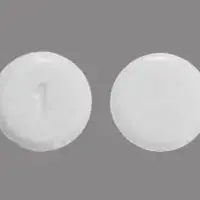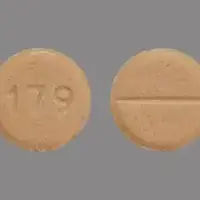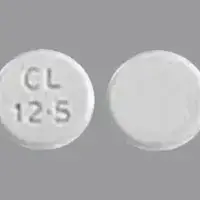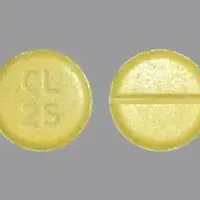Generic name: tetrabenazine (tet ra ben' a zeen)
Drug class: VMAT2 inhibitors
Dosage form: tablet (12.5mg, 25mg)
Availability: Prescription only
Pregnancy & Lactation: Risk data available
Brand names: Xenazine
What is Tetrabenazine?
Tetrabenazine tablets are used to treat involuntary movements (chorea) caused by Huntington's disease, which is a rare, inherited disease that causes nerve cells in the brain to breakdown and die. Tetrabenazine helps control involuntary body movement of Huntington’s disease, but does not help the psychiatric and thinking (cognitive) symptoms, and it does not cure the disease.
Tetrabenazine is thought to work by changing the level of natural substances in the brain that control muscle movement.
Tetrabenazine (Brand name: Xenazine) is from the class of medications called vesicular monoamine transporter 2 (VMAT2) inhibitors. Tetrabenazine has its effect by blocking the protein VMAT2 which lowers the amount of messenger chemicals (dopamine, serotonin, norepinephrine, and histamine) in the nerve cells, which is how it is thought to help control involuntary body movements.
Warnings
You may have depression or thoughts about suicide while taking tetrabenazine. Stay alert to changes in your mood or symptoms. Report any new or worsening symptoms to your doctor.
You should not use tetrabenazine if you have severe or untreated depression, suicidal thoughts, liver disease, or if you have taken reserpine in the past 20 days.
Do not use tetrabenazine if you have used an MAO inhibitor in the past 14 days. A dangerous drug interaction could occur. MAO inhibitors include isocarboxazid, linezolid, methylene blue injection, phenelzine, rasagiline, selegiline, tranylcypromine, and others.
How should I take Tetrabenazine
Take tetrabenzaine exactly as prescribed by your doctor. Follow all directions on your prescription label. Your doctor may occasionally change your dose to make sure you get the best results. Do not use tetrabenazine in larger or smaller amounts or for longer than recommended.
You may take tetrabenazine tablets with or without food.
Call your doctor if your symptoms do not improve, or if they get worse.
You should not stop using tetrabenazine suddenly or your symptoms may return. Talk to your doctor before you stop taking this medicine.
Dosing information
When first prescribed tetrabenazine should be increased slowly over several weeks to identify a dose that reduces chorea and is tolerated.
Usual Tetrabenazine Adult Dose for Huntington Disease:
Initial dose:
First week: 12.5 mg orally daily
Second week: 12.5 mg orally 2 times daily
Maintenance dose:
Increase by 12.5 mg orally weekly to tolerated dose that reduces chorea.
Doses of 37.5mg to 50 mg daily should be administered in 3 divided doses.
Maximum recommended single dose: 25 mg
Comments:
Determine CYP450 2D6 metabolizer status in patients who require doses of greater than 50 mg per day.
Before Taking
You should not use tetrabenazine if you are allergic to it or any of the inactive ingredients, or if you have:
- severe or untreated depression;
- suicidal thoughts;
- liver disease; or
- if you have taken reserpine in the past 20 days.
Do not use tetrabenazine if you have used an MAO inhibitor in the past 14 days. A dangerous drug interaction could occur. MAO inhibitors include isocarboxazid, linezolid, methylene blue injection, phenelzine, rasagiline, selegiline, tranylcypromine, and others.
To make sure tetrabenazine is safe for you, tell your doctor if you have:
- depression, an emotional disorder, or mental illness;
- a history of suicidal thoughts or actions;
- past or present breast cancer;
- heart disease or heart rhythm disorder;
- a personal or family history of long QT syndrome; or
- if you recently had a heart attack.
Taking tetrabenazine may increase your risk of depression or thoughts about suicide. Your doctor should check your progress at regular visits. Your family or other caregivers should also be alert to changes in your mood or symptoms.
Pregnancy
It is not known whether this medicine will harm an unborn baby. Tell your doctor if you are pregnant or plan to become pregnant.
Breastfeeding
It is not known whether tetrabenazine passes into breast milk or if it could harm a nursing baby. You should not breastfeed while using this medicine.
What happens if I miss a dose?
Take the missed dose as soon as you remember. Skip the missed dose if it is almost time for your next scheduled dose. Do not take extra medicine to make up the missed dose.
If you miss your doses for more than 5 days in a row, ask your doctor before you start taking tetrabenazine again.
What happens if I overdose?
Seek emergency medical attention or call the Poison Help line at 1-800-222-1222.
What should I know about storage and disposal of this medication?
Keep this medication in the container it came in, tightly closed, and out of reach of children. Store it at room temperature and away from excess heat and moisture (not in the bathroom).
It is important to keep all medication out of sight and reach of children as many containers (such as weekly pill minders and those for eye drops, creams, patches, and inhalers) are not child-resistant and young children can open them easily. To protect young children from poisoning, always lock safety caps and immediately place the medication in a safe location – one that is up and away and out of their sight and reach. http://www.upandaway.org
Unneeded medications should be disposed of in special ways to ensure that pets, children, and other people cannot consume them. However, you should not flush this medication down the toilet. Instead, the best way to dispose of your medication is through a medicine take-back program. Talk to your pharmacist or contact your local garbage/recycling department to learn about take-back programs in your community. See the FDA's Safe Disposal of Medicines website (http://goo.gl/c4Rm4p) for more information if you do not have access to a take-back program.
What special dietary instructions should I follow?
Unless your doctor tells you otherwise, continue your normal diet.
What should I avoid while using Tetrabenazine?
Tetrabenazine may impair your thinking or reactions. Be careful if you drive or do anything that requires you to be alert.
Drinking alcohol with this medicine can cause side effects.
Tetrabenazine side effects
Get emergency medical help if you have signs of an allergic reaction: hives; difficulty breathing; swelling of your face, lips, tongue, or throat.
Report any new or worsening symptoms to your doctor, such as: mood or behavior changes, anxiety, panic attacks, trouble sleeping, or if you feel impulsive, irritable, agitated, hostile, aggressive, restless, hyperactive (mentally or physically), more depressed, or have thoughts about suicide or hurting yourself.
Tetrabenazine may cause serious side effects. Call your doctor at once if you have:
- tremors, shaking, restless movement, problems with balance;
- uncontrolled muscle movements in your face (chewing, lip smacking, frowning, tongue movement, blinking or eye movement);
- trouble swallowing;
- fast or pounding heartbeats;
- a light-headed feeling, like you might pass out; or
- severe nervous system reaction--very stiff (rigid) muscles, high fever, sweating, confusion, fast or uneven heartbeats.
Common side effects of tetrabenazine may include:
- drowsiness, tiredness;
- depressed mood;
- nausea; or
- feeling anxious, agitated, or restless.
This is not a complete list of side effects and others may occur. Call your doctor for medical advice about side effects. You may report side effects to FDA at 1-800-FDA-1088.
See more: Tetrabenazine Side EffectsWhat other drugs will affect Tetrabenazine?
Other drugs may interact with tetrabenazine, including prescription and over-the-counter medicines, vitamins, and herbal products. Tell each of your health care providers about all medicines you use now and any medicine you start or stop using.
It is important to tell your doctor if you take:
- reserpine
- monoamine oxidase inhibitors (MAOIs);
- alcohol or other sedating drugs;
- Drugs that cause QTc prolongation including antipsychotic medications (e.g., chlorpromazine, haloperidol, thioridazine, ziprasidone), antibiotics (e.g., moxifloxacin), Class 1A (e.g., quinidine, procainamide) and Class III (e.g., amiodarone, sotalol) antiarrhythmic medications or any other medications known to prolong the QTc interval;
- neuroleptic drugs (e.g., chlorpromazine, haloperidol, olanzapine, risperidone, thioridazine, ziprasidone);
- strong CYP2D6 inhibitors;
- deutetrabenazine or valbenazine.
For more information on interactions with tetrabenazine click on the link below.
What other information should I know?
Keep all appointments with the laboratory. Your doctor may order certain lab tests to check your body's response to tetrabenazine.
Do not let anyone else take your medication. Ask your pharmacist any questions you have about refilling your prescription.
It is important for you to keep a written list of all of the prescription and nonprescription (over-the-counter) medicines you are taking, as well as any products such as vitamins, minerals, or other dietary supplements. You should bring this list with you each time you visit a doctor or if you are admitted to a hospital. It is also important information to carry with you in case of emergencies.







